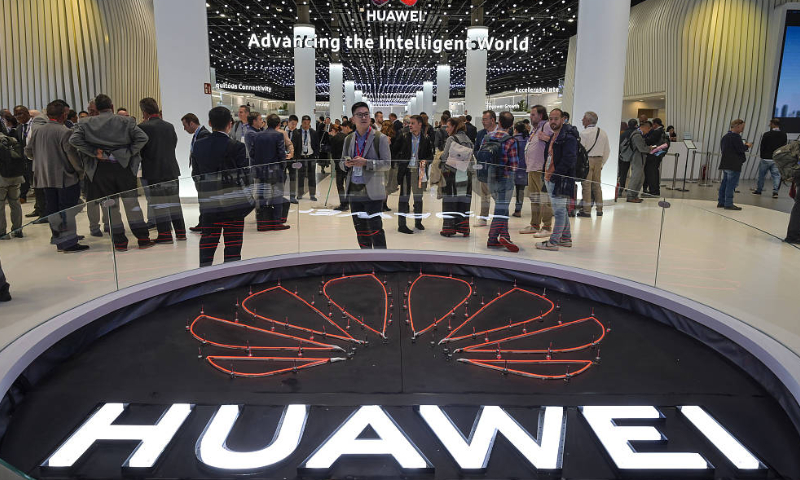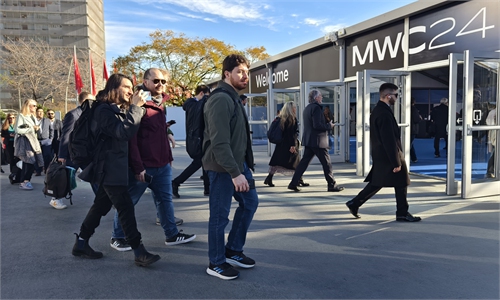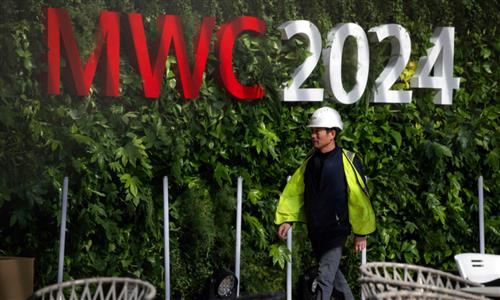Why has Chinese firms' performance become a feature at MWC Barcelona?: Global Times editorial

Huawei exhibition booth at the Mobile World Congress (MWC) 2024 in Barcelona, Spain Photo: VCG
The atmosphere at the Mobile World Congress (MWC) 2024 in Barcelona, Spain, is bustling and extraordinary these days. As one of the largest technology exhibitions in the global mobile communications field, with the theme "Future First," this year's congress focuses on six major areas, including surpassing 5G and humanized artificial intelligence (AI). This year's event is the largest in the past five years, attracting participation of more than 2,400 companies from over 200 countries and regions, and the registered attendance has exceeded 100,000 people. The participation of Chinese companies is particularly eye-catching and continues to be a major feature of the exhibition. With over 300 Chinese companies participating, double the number from last year, it has been described by the overseas media as a place where "Chinese tech titans take center stage."
In recent years, the outstanding performance of Chinese enterprises has become a standard feature of the MWC Barcelona, and some foreign media outlets have claimed that Barcelona is increasingly becoming a platform for Chinese companies to showcase their strength. This year, Chinese enterprises have brought many cutting-edge technologies once again, some of which were global premieres. For instance, Honor unveiled the first AI PC, Xiaomi showcased a robotic dog and the electric vehicle Xiaomi SU7. As the largest exhibitor, Huawei released a comprehensive 5.5G product solution and officially introduced the first large-scale model in the communication industry. The participation of numerous international companies, including Chinese enterprises, has transformed the MWC Barcelona from a European-focused smart device launch event into a global hub for discussions on interconnectedness. Its status and advantages in global technology exhibitions of similar scale have become more prominent.
To assess whether an exhibition is well-organized or not, one must consider a series of hardware conditions, such as the size of the venue and the quality of reception services. However, more importantly, it is crucial to evaluate the "soft environment" provided by the organizers, especially whether it adopts an open and inclusive attitude toward global enterprises. So far, the MWC Barcelona has excelled in this crucial aspect. As the Global System for Mobile Communications Association (GSMA), the organizer, has previously stated, "We will not exclude Huawei and ZTE." At this exhibition, many Chinese enterprises are participating for the first time, indicating their willingness to make Barcelona the first destination in their journey toward the world. This also highlights the positive atmosphere that has been established in Barcelona.
This also inevitably reminds people of the Consumer Electronics Show (CES) that ended in Las Vegas, US, more than a month ago. There was a time when a similar "China phenomenon" in which innovative Chinese companies are popular appeared at CES, which is also an important global technology exhibition. However, now due to the sanctions imposed by the US on Chinese companies, especially advanced enterprises, as well as the discriminatory market and business environment against China as a whole, this year, it is almost difficult to find the presence of leading high-tech companies from China at the exhibition. This not only causes the American market and consumers to miss the opportunity to enjoy better quality and more affordable products, but also significantly reduces the influence and representativeness of CES as a global technology event. In fact, CES has become a sacrificial lamb of American political intervention in technology development and cooperation.
Due to the US taking the lead in attacking Chinese advanced companies such as Huawei and ZTE, the organizers of the MWC Barcelona have also faced pressure, but ultimately chose to "align technological developments for the benefit of people, industries and society in a fragmented geopolitical environment." As a result, the MWC Barcelona is becoming increasingly influential. In fact, whether it is CES or MWC Barcelona, any international cutting-edge technology exhibition that aims to promote the common technological progress of humanity needs to have a mind-set that transcends narrow geopolitical perspectives. It is the adherence to the correct attitude of open cooperation that has blossomed into a win-win cooperation in Barcelona, protecting the good atmosphere for future technological cooperation. This should not be destroyed.
We noticed that on the same day of the opening, the US, along with nine other countries, issued a joint statement in support of a set of principles to advance 6G technology, and the AI-RAN alliance led by NVIDIA and consisting of 11 initial members was established. The theme of the MWC Barcelona is "Future First." To some extent, the further away geopolitics is from technological development and cooperation, the closer the world is to the future. If the above dynamics are moving toward benefiting all mankind through technological development and pursuing progress in a fair and competitive manner, then there is nothing wrong with it. However, if it is driven by some narrow-minded thinking to suppress the "excellent outliers" in one's own eyes, then it is obviously contrary to the pursuit of "Future First" and should be guarded against.


